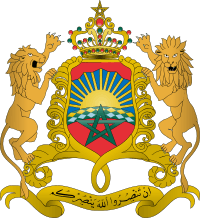Makhzen
 |
| This article is part of a series on the politics and government of Morocco |
|
Monarchy |
|
Government |
| Judiciary |
|
Makhzen (Moroccan Arabic: لمخزن, Berber: Elmexzen / Eřmexzen) is the governing institution in Morocco and in pre-1957 Tunisia, centered on the king and consisting of royal notables, top-ranking military personnel, landowners, security service bosses, civil servants and other well-connected members of the establishment. The term "Makhzen" is also popularly used in Morocco as a word meaning "State" or "Government".
Etymology
The word makhzen (Arabic: مخزن) literally means "warehouse" in Maghrebi Arabic (from khazana "to store up"[1]), where the king's civil servants used to receive their wages; but this usage of the word became in Moroccan Arabic synonymous with the elite. It is likely a metonymy related to taxes, which the makhzen used to collect; the term may also refer to the state, but this usage is increasingly rare and is primarily used by the older generation. Recently, the term is also being used to describe the police.
The word has also been adopted into Spanish, Portuguese with a different meaning, as almacén and armazém (with addition of the Arabic definite article), and into French and Italian as magasin (meaning "store") and magazzino. It came into the English language from Middle French as magazine, originally referring to a storehouse for ammunition and later to publications. With the "store" meaning, it was also adopted from French into Russian as ru:Магазин.
In the Berber culture of Morocco, the Berber equivalent of "mekhzen" (warehouse) would be agadir. Berber tribes also considered the agadir (warehouse of the tribe's crops and valuables) as a powerhouse guarded and managed through a legal system. The Arabic word "makhzen" is probably a translation of the original Berber word "agadir".
Makhzen in Morocco
The Makhzen is a very ancient notion in Morocco, it roughly coincides with the notion of the feudal state predating the French protectorate in Morocco. Resident-General Hubert Lyautey (ruler of Morocco during the French occupation, in office 1912-25) was a fervent proponent of indirect colonisation, especially in Berber-speaking areas, and kept that role and even enhanced it by given an important role to local notables such as Thami El Glaoui, to act as a relay between the population and the French authorities to govern the country.
References
See also
- Auxiliary Forces (Mokhzani)